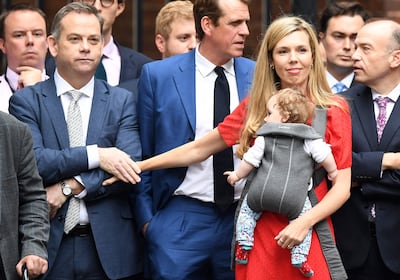Mary Killen, the writer and columnist, tells a story of when Boris Johnson was editor of The Spectator, she and other employees would besiege his office trying to find their boss.
It was a similar feeling on Wednesday for a Cabinet delegation that formed in the afternoon to find the prime minister and tell him to resign in a bid to force him out. Only after telling them all to go away and launching a failed reshuffle of his ranks did Mr Johnson submit to his colleagues on his own terms the following morning after sleeping on his predicament.
Mr Johnson rose to power by force of charisma but he is also constantly on the run, two facets of his character that coincided agonisingly in the last months of his leadership.
In an interview in Tatler magazine with Ms Killen, his mother Charlotte told of the lasting scars on the family of her period of treatment in a UK hospital in 1974 while the children then lived in Brussels with their father.
“Charlotte says she will never forget the pain of the children running down the hospital corridor to see her and then having to leave again,” the article noted, going on to quote the mother as describing her son as “soft-hearted” and quite different to how he is widely perceived.
After a difficult start in a broken home, Alexander Boris de Pfeffel Johnson, “one-man melting pot” with Jewish, Muslim and Christian roots, who declared at 8 years old that he intended to become “world king”, won a scholarship to Eton College, the country’s most illustrious school.
Martin Hammond, his housemaster at Eton, wrote prophetically in his 1982 school report about an almost religious dedication to rule-breaking.
“I think he honestly believes that it is churlish of us not to regard him as an exception, one who should be free of the network of obligation which binds everyone else,” he said.
Moving on to the University of Oxford, he was a hard-living student who hung around with Princess Diana’s brother, now Earl Charles Spencer, and formed a lifetime rivalry with former prime minister David Cameron.
After a rocky start in journalism, Mr Johnson made his name as a Brussels correspondent for The Daily Telegraph newspaper.
Conrad Black, the Canadian entrepreneur who owned paper and The Spectator, was a fierce champion of the man he promoted from journalist to editor but even he acknowledges there were as many detractors as those in his thrall.
“He possesses a number of remarkable qualities,” he said. “He had his lapses, but he was capable, successful and reliable when it counted.”
Breaching a promise not to go directly into politics from the editor’s chair, Mr Johnson became MP for Henley in 2001. He was sacked from the Conservative front bench in 2004 but went on to reinvent himself as the party’s London mayoral candidate in 2008.
The crowning moment of that two-term period was the globally successful London summer Olympics and, in 2015, he returned to Parliament. Along the way, Mr Johnson's private life provided a steady stream of headlines. Trice-married, he and his wife Carrie welcomed two children into the world during their almost three years in Downing St.

The big issue with which he will forever be identified is Britain leaving the EU in the referendum in June 2016. After that he became foreign secretary under Theresa May but left her government when she tried to find a compromise position with the EU to complete the Brexit process.
Mrs May fell soon after. In the leadership run-off he won two thirds of the membership vote over Jeremy Hunt, his rival for the Conservative leadership.
Victory came in characteristic fashion, Mr Johnson waved a fish onstage in a prime-time debate and wrongly claimed the EU had forced British fishmongers to deliver the product with “ice pillows”.
As prime minister, he triggered a snap election in December of 2019 and won by a majority of more than 80 for the first time since 2005.
To help achieve this landslide, Mr Johnson had claimed that he had an oven-ready deal to get Brexit done. But even now the issue is far from done. In recent weeks he was preparing to declare that the Northern Ireland Protocol, a pillar of his deal, would have to be scrapped, a move his critics condemned as illegal.
For the longest time, the variables of risk and reward were said to be “baked in” to Mr Johnson’s political share price.
What became known as Partygate, the police and official reports into gatherings at No 10 Downing Street when the country was in lockdown, upended all those calculations. The focus is now on his character and, for that reason, many believe another Conservative revolt is merely a matter of when.
A fair slice of the MPs who deserted the prime minister will have felt betrayed in political terms by Mr Johnson. Others bore a more personal toll of let-down and disappointment.
Sonia Purnell, a biographer and former colleague, believes the prime minister will not try to relaunch as a face of worthy causes after government.
“Don’t hold your breath for a Johnson global idea think tank or worthy charitable foundation when he finally departs Downing Street, but who excepts the deluded or desperate will want anything to do with him then anyway?” she asked.







































































